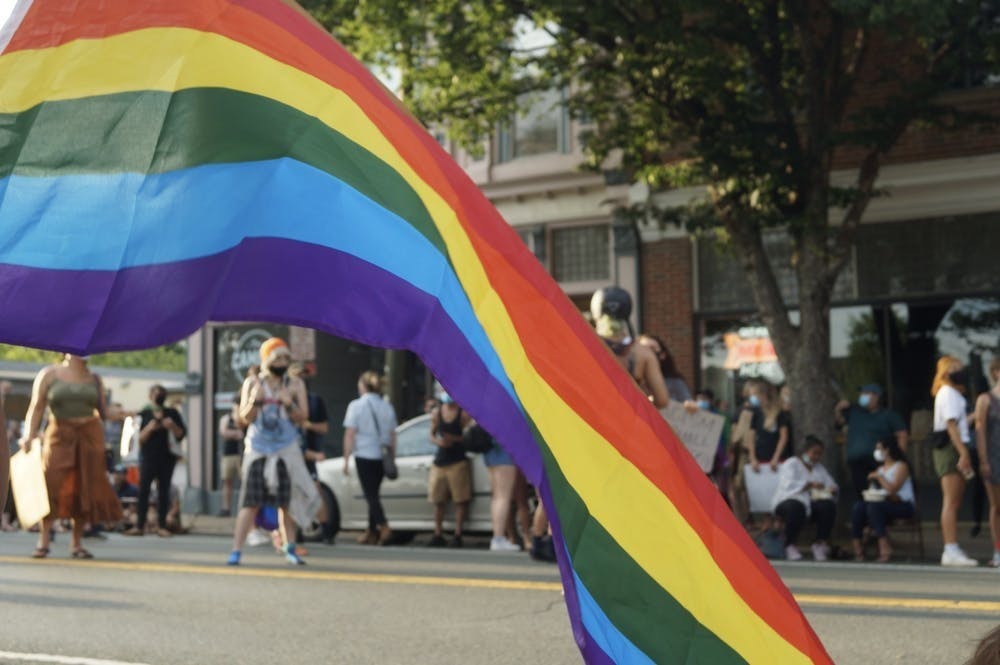中文版请点击此处
The United States is an incredibly heteronormative and cisnormative nation. From birth, we are each assigned a gender, based off of our physical genitalia. We are then assumed to be heterosexual. These two assumed identities are rooted in anti-queer and trans discrimination. This false notion that everyone is cisgender and heterosexual is what causes outrage when people identify as something else. To challenge the assumption is to somehow prove your inferiority. At least, that’s the train of thought that drives queerphobia and transphobia.
In October, Devan Coombes, a writer for The Cavalier Daily’s Opinion section, published a column refuting two earlier columns by Nicole Chebili. The first of Chebili’s columns argued against the religious exemptions present in the University’s restriction of large gatherings on Grounds due to COVID-19. Chebili’s second column discussed the incredibly queerphobic statement of faith by the Fellowship of Christian Athletes — which has a chapter at the University — that requires students seeking leadership positions to vow only to marry someone of the opposite sex.
In her article, Coombes exhibits a troubling thought process that exemplifies the instinctive queerphobia so many Americans possess. Coombes, without providing her “traditional definition of marriage,” defends the FCA’s statement of faith. This therefore leaves us to conclude that this concept of traditional marriage refers to a bond between one man and one woman, as proposed on the FCA’s website. While this may seem a small matter, painting heterosexuality as the status quo — or the given — ignores queer love and rights. The FCA isn’t rooted in societal or Biblical traditions of marriage — it’s just queerphobic.
And let’s be clear — there is no such thing as traditional marriage. Queer and trans people are not twenty-first century inventions. Drawing ties between heteronormativity and tradition undermines queer identity. This practice rejects our own history whilst lifting false notions of tradition above us. Homosexuality in Ancient Rome and the Hindu deification of transgender hijras both indicate a lack of heteronormative traditions. In truth, the only modern inventions here are queerphobia and transphobia. To feign that a man with a penis and a woman with a vagina continue some tradition when they marry is simply to spite queer people.
Coombes relies on the First Amendment to defend the right of Christian groups to be explicitly homophobic in their practices. She promotes the freedom of religion. Yet the FCA does not promote the freedoms of Christian denominations who celebrate marriage equality, nor the right of queer Christians to be leaders in their faith. Moreover, Coombes claims to defend freedom of speech, only as long as it keeps other people’s mouths shut — in this case, queer people who want to get married. This is an attack on the right to speech of queer people who want to say “I do” at their wedding. It’s a repulsive prejudice, and I’m frankly ashamed to see it published not only in this newspaper but by a student at this University.
Chebili correctly asserts that though the FCA doesn’t technically ban queer members, its statement of faith practically prevents them from being their true self. Gautam Bhatia wrote about the 2014 case NALSA v. UoI, which protected the prohibition of homosexual acts in India — a prohibition not rooted in India itself, but rather in the British colonial empire. He stated that a “law that targets conduct, conduct that is the very expression of identity, thereby targets identity itself.” By preventing the “conduct” of marriage, the FCA undermines freedom of identity, and thus expression.
The rise of colonial empires across the world instilled queerphobic and transphobic values on an international level. While these aren’t exclusively Eurocentric values, there’s no doubt that British colonialism’s horrid history is what keeps these prejudices alive in 2020. Undermining queer and trans identity goes hand in hand with racism, capitalism, misogyny and ableism. These systems intersect too — Black and Latinx trans women in America are victims of disproportionate violence when compared to white cisgender queer men. The term LGBTQ+ and the media’s coverage of queer and trans issues might have us think they’re all one in the same, but that’s far from reality.
Chebili’s pieces are both necessary reads. We still see a refusal of this country to completely separate church and state, despite the United States Constitution outlining this exact separation. The longer religious groups receive tax, medical or social exemptions, the longer we perpetuate that false sense of tradition. Let this also be a reminder that Vice President Mike Pence has routinely advocated against queer and trans equality, including a futile attempt to constitutionally define marriage as the FCA does. And just last month, Amy Coney Barrett, the Trump-appointed Supreme Court justice, suggested in her confirmation hearings that sexuality is simply a choice. As a judge, Barrett’s entire career revolves around the precise use and interpretation of words. There’s no excuse for her or Pence’s queerphobia. Religion is never a justification for hatred.
The thought Coombes perpetuates in her column must come to an end — in the University community, in America and in the world at large. Until then, I hope all queer and trans people rest assured that their identity is beautiful — it is the oppressors that possess the ugly.
Bryce Wyles is a Viewpoint Writer for The Cavalier Daily. He can be reached at opinion@cavalierdaily.com.
The opinions expressed in this column are not necessarily those of The Cavalier Daily. Columns represent the views of the authors alone.







